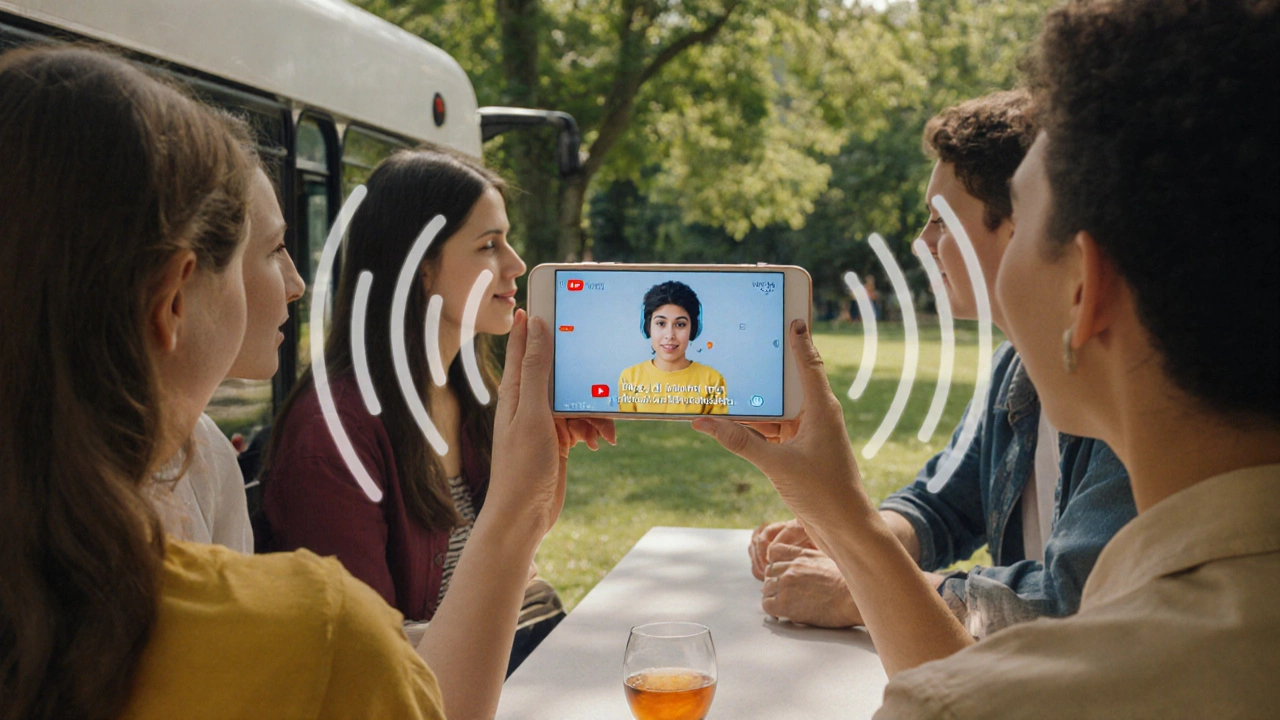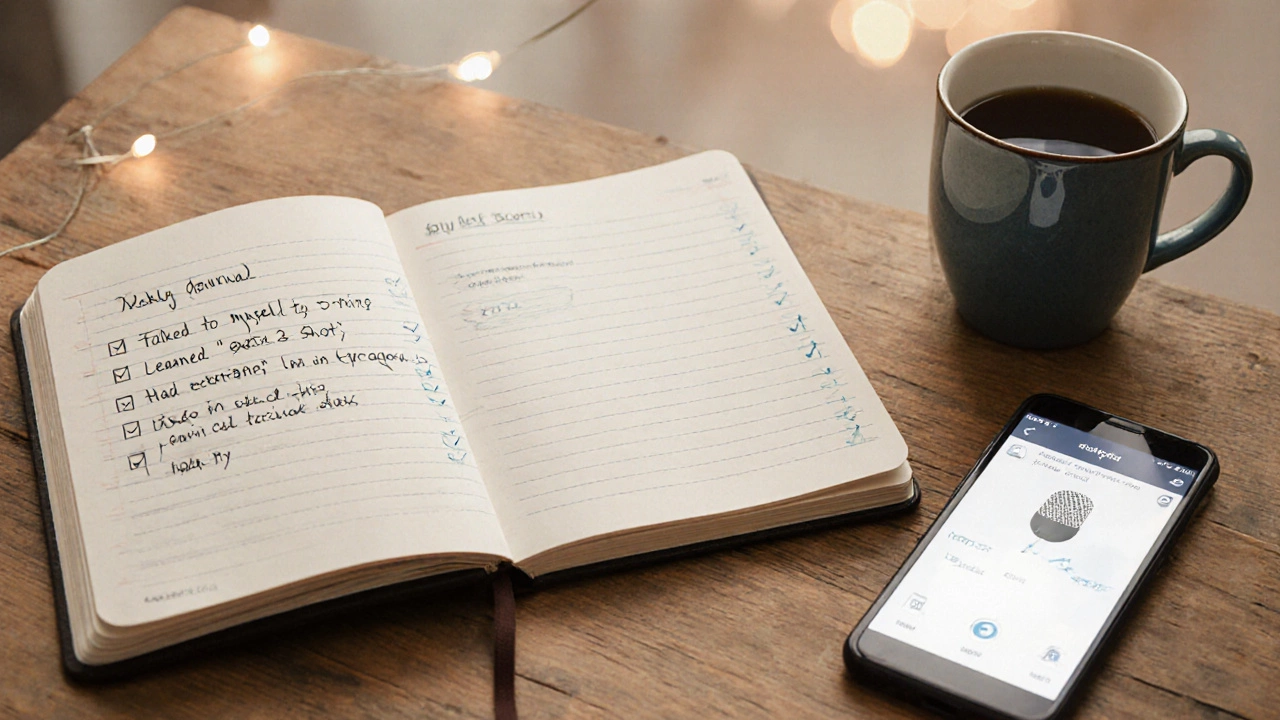Want to speak English better but feel stuck? You’re not alone. Millions of people around the world know grammar rules, can write essays, and understand movies-but freeze when someone asks them a simple question in English. The problem isn’t lack of knowledge. It’s lack of practice.
Stop learning. Start speaking.
Most people spend years memorizing vocabulary and verb tenses, then wonder why they still can’t hold a conversation. The truth? Speaking isn’t learned from books. It’s learned by doing. You don’t become a swimmer by reading about water. You jump in. Same with English. Start small. Talk to yourself. Out loud. While brushing your teeth. While walking the dog. Describe what you’re doing: "I’m putting on my shoes. The laces are too tight. I need to tie them again." It feels silly at first. But your brain starts wiring new connections. You stop translating from your native language. You start thinking in English.Find your voice, not perfection
You don’t need perfect grammar to be understood. You need clarity. Native speakers make mistakes all the time. They use contractions, drop words, say "gonna" instead of "going to." That’s not bad English. That’s real English. Focus on being understood, not flawless. If you say, "I go to store yesterday," most people will still get it. Correcting every error while speaking kills your confidence. Save corrections for later. Record yourself speaking for 60 seconds. Listen back. Notice one thing you said clearly. Celebrate that. Then try again tomorrow.Use real conversations, not textbooks
Textbooks teach you how to say, "I would like to order a coffee, please." Real life doesn’t work like that. People say, "Hey, can I get a latte?" or "Coffee, please-extra shot." Watch YouTube videos of native speakers in casual settings. Try channels like "English Addict with Mr Steve" or "Learn English with Emma." Don’t just watch. Pause and repeat what they say. Mimic their rhythm, their pauses, their tone. Copying speech patterns trains your mouth muscles. It’s like learning to play guitar-you need to train your fingers, not just read chords.Speak daily, even for five minutes
Consistency beats intensity. Ten minutes a day, every day, will change you more than three hours once a week. Set a daily alarm: "Speak English now." Here’s how to make it stick:- Call a language partner on Skype or Tandem. No need to be fluent. Just say hello and talk about your day.
- Join a free online English meetup. Sites like Meetup.com or Discord have groups for learners.
- Use voice assistants. Ask Siri or Google Assistant questions in English. "What’s the weather today?" "Tell me a joke."
- Record a voice note to yourself. Talk about what you ate, what you watched, what made you laugh.
Don’t wait for "the right time." There is no perfect moment. The best time is now.

Build a speaking habit around things you love
If you love cooking, describe recipes in English. If you watch soccer, comment on the game out loud: "That pass was perfect! He didn’t see the defender coming." If you’re into music, sing along and pronounce every word clearly. Your brain learns faster when it’s engaged. Learning English while doing something you enjoy isn’t studying. It’s playing.Get feedback-without fear
Feedback is the fastest way to improve. But most people avoid it because they’re afraid of being corrected. Find one person you trust-a friend, teacher, or online tutor-and ask them: "Can you correct me when I make mistakes? Just point it out, don’t stop the conversation." Most people will say yes. And when they do, you’ll notice patterns. Maybe you always say "I have 25 years" instead of "I’m 25." Once you know that, you fix it. Apps like ELSA Speak or Grammarly for Speech give instant feedback on pronunciation. They don’t replace human feedback, but they help you hear what your mouth is doing wrong.Stop translating in your head
This is the biggest barrier for most learners. You hear a question. You think: "What’s the word for this in my language? How do I say it in English?" By the time you answer, the conversation moved on. Train your brain to skip the middle step. Start by labeling things around you in English. Your phone. Your coffee cup. Your chair. When you see them, say the word out loud. Soon, you’ll start thinking: "I need to charge my phone," not "I need to charge my móvil." Try this exercise: For 10 minutes, don’t speak your native language at all. Think, whisper, and talk only in English. Even if it’s just "I’m tired," "This is hard," "I want to eat." Your brain adapts faster than you think.
Surround yourself with English
Change your phone’s language to English. Switch your Netflix to English with English subtitles. Listen to English podcasts during your commute. Even if you don’t understand everything, your ears get used to the sound. In Wellington, I notice people who improve fastest are the ones who don’t wait for class. They turn their daily life into a classroom. They read signs, listen to ads, repeat phrases they hear on the bus. It’s not magic. It’s exposure.What slows people down? Three common mistakes
- Waiting to be ready. You’ll never feel 100% ready. Start now.
- Fearing mistakes. Every error is data. It tells you what to work on.
- Only speaking with other learners. You need to talk to native speakers-even if they speak fast. Your brain learns by adapting.
Don’t compare yourself to others. Someone else might have been learning longer. But you’re on your own path. Progress isn’t linear. Some days you’ll feel stuck. Other days, you’ll surprise yourself. That’s normal.
Track your progress
Keep a simple journal. Every week, write down:- One thing you said clearly.
- One new phrase you learned.
- One conversation you had-even if it was short.
Look back after a month. You’ll see how far you’ve come. You’ll realize you’re not stuck. You’re moving.
Next steps: Your 7-day speaking challenge
Start tomorrow. Here’s your plan:- Day 1: Talk to yourself for 5 minutes. Describe your room.
- Day 2: Watch a 3-minute YouTube video. Pause and repeat each sentence.
- Day 3: Call a language partner. Ask one question. Listen to the answer.
- Day 4: Record yourself answering: "What did you do today?" Play it back.
- Day 5: Label five objects around you in English. Say them out loud.
- Day 6: Watch a movie scene with no subtitles. Guess what’s being said.
- Day 7: Have a 2-minute conversation in English. No matter how simple.
After seven days, you won’t be fluent. But you’ll be different. You’ll speak without waiting for permission. You’ll know you can do it-even if you’re not perfect.
How long does it take to speak English fluently?
There’s no fixed timeline. It depends on how much you practice, not how long you’ve studied. Someone who speaks 30 minutes a day can sound natural in 6-8 months. Someone who only speaks in class once a week might take years. Fluency isn’t about time. It’s about frequency.
Should I take an English speaking course?
Only if it forces you to speak. Many courses teach grammar and writing, not conversation. Look for courses that include daily speaking tasks, live feedback, and real conversations-not just quizzes. Free options like iTalki, Tandem, or local library meetups often work better than expensive programs.
I’m too shy to speak. What can I do?
Start alone. Talk to your pet, your mirror, your plants. Then move to voice notes. Then to online chats where you can type first, then speak. Shyness fades with small wins. Every time you speak, even for 30 seconds, you prove to yourself that you can do it.
Is it okay to make mistakes?
Yes. Mistakes are how you learn. Native speakers don’t expect perfection. They expect effort. If you say, "I goed to the store," they’ll understand you. And if you keep saying it, you’ll fix it on your own. The only wrong thing is staying silent.
What’s the fastest way to improve?
Speak every day-even if it’s just to yourself. Combine that with listening to real English (podcasts, shows, conversations). Add one new phrase each day. Don’t memorize lists. Use what you learn right away. That’s how memory sticks.

